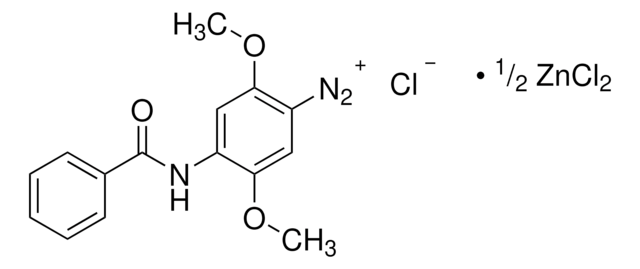202487
Poly(ethylene glycol) methyl ether
average MN 550, methoxy, hydroxyl
Synonym(s):
Polyethylene glycol, Methoxy poly(ethylene glycol), Polyethylene glycol monomethyl ether, mPEG
About This Item
Recommended Products
product name
Poly(ethylene glycol) methyl ether, average Mn 550
vapor density
>1 (vs air)
Quality Level
vapor pressure
0.05 mmHg ( 20 °C)
form
semisolid
mol wt
average Mn 550
refractive index
n20/D 1.455
viscosity
7.5 cSt(210 °F)(lit.)
transition temp
Tm 20 °C
density
1.089 g/mL at 25 °C
Ω-end
hydroxyl
α-end
methoxy
InChI
1S/C3H8O2/c1-5-3-2-4/h4H,2-3H2,1H3
InChI key
XNWFRZJHXBZDAG-UHFFFAOYSA-N
Looking for similar products? Visit Product Comparison Guide
Application
Poly(ethylene glycol) methyl ether-grafted polyamidoamine (PAMAM) dendrimers can be used as drug carrier systems for anticancer drugs.
Storage Class Code
10 - Combustible liquids
WGK
WGK 1
Flash Point(F)
359.6 °F - closed cup
Flash Point(C)
182 °C - closed cup
Choose from one of the most recent versions:
Certificates of Analysis (COA)
Don't see the Right Version?
If you require a particular version, you can look up a specific certificate by the Lot or Batch number.
Already Own This Product?
Find documentation for the products that you have recently purchased in the Document Library.
Customers Also Viewed
Articles
Biofouling control essential for device performance and safety; minimize accumulation of biomolecules and bioorganisms.
Biofouling control essential for device performance and safety; minimize accumulation of biomolecules and bioorganisms.
Biofouling control essential for device performance and safety; minimize accumulation of biomolecules and bioorganisms.
Biofouling control essential for device performance and safety; minimize accumulation of biomolecules and bioorganisms.
Our team of scientists has experience in all areas of research including Life Science, Material Science, Chemical Synthesis, Chromatography, Analytical and many others.
Contact Technical Service




